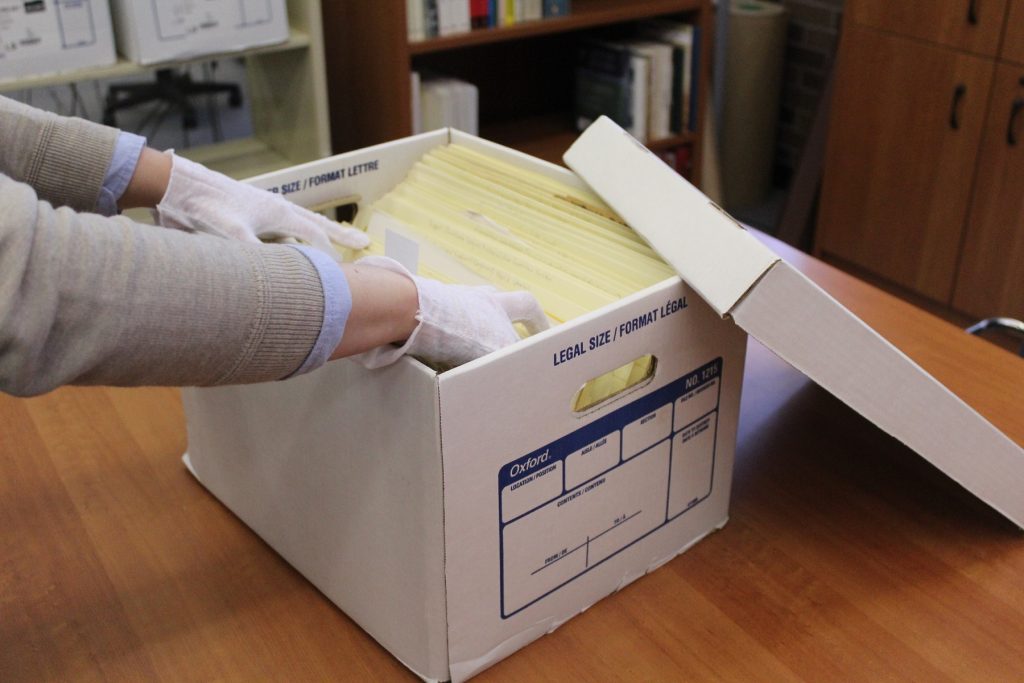Students given opportunity to access archives from Montreal’s Negro Community Centre for class
Having access to historical archives as an undergraduate student is a rare opportunity. Being able to search through a large collection thoroughly and extensively usually takes months, if not years. The Concordia students taking the history course “Telling Stories” were able to readily access and study a wide variety of documents in a short period of about three months. Standing in the place where archives were created and kept for the better half of a century is something only a few can claim to have experienced. The students are now among those few.
The course aims to immerse students in the historical narrative of a particular topic and provide them with a hands-on learning experience. This semester, it was offered by history professor and founder of the Centre for Oral History and Digital Storytelling, Steven High.
High, who partnered with Alexandra Mills from Concordia’s Libraries Special Collections and research assistant Desiree Rochat to create the class, based the content of it around archives from Montreal’s Negro Community Centre (NCC). The NCC held particular importance in the surrounding community for being the core of integral activities such as music festivals, sports tournaments, and communal meetings. The centre, which was active from the late 1920s to the early 1990s, operated on the basis of acknowledging and improving the status of Montreal’s Negro community. The archives hadn’t been touched since the centre’s closing, giving students the unique chance to have a blank slate and draw their own conclusions from what they found.
Teejay Bhalla, a second-year history student, admitted to being intimidated by the task of creating a historical profile of the NCC without access to any additional information. At the beginning of the term, each student was assigned a box of archival documents, which they had to study in order to draw some sort of conclusion about the NCC’s role within its community. Because the documents are from as early as the 1940s, the students were left to their own devices to come up with any inferences about what they could suggest. “It’s not something that any of us have really ever done,” Bhalla said.
Working with actual documents from a cultural hub such as the NCC presented the students with a surprising challenge. “This stuff isn’t on Google. [These are] internal documents from an organization, and we are representing them. Whatever we write has to be dead on, or at least—if we are expressing our opinion—it has to be based off of fact,” Bhalla said.
Despite being slightly intimidated, a number of the students in the “Telling Stories” course were excited for the rare opportunity to work with physical archives, which included photographs, letters to leaders of social movements of the time, and plans of events that were held at the centre. For Summit Ollivierre, a third-year psychology and German studies student, the motivation to take the class came from a personal connection to the area where the students were going to do their research. The NCC was located in Little Burgundy, a section of Montreal’s southwest that has a history of housing a large African-American population.

“I know a lot of people from Little Burgundy,” Ollivierre said. “My family is black, and we’ve been here for a while, so I thought maybe I’ll find something out about my family … and the opportunity to work with archives is not something that ever happens to undergrads.”
On March 20th, the students took a walk through Little Burgundy, which they said their professor planned as a way for them to contextualize what they had found in their research. “We are literally 10 minutes away from all this information,” said Audrey Medaino-Tardif, a second-year honours history student. “We got to actually visualize everything that we’ve been researching.”
The community aspect of their research is something High’s students emphasized often. Some were astounded by how much information they came across that seemed to be such a large part of Montreal’s history, but which they had not been exposed to prior to taking this course.
As Medaino-Tardif explained, “[in school], I learned this very washed-out history. I didn’t learn about African-Americans in Montreal. I didn’t learn that there were slaves in Montreal, that there were slaves in Canada. So there are all these things that I learned [during the course] that were absolutely surprising.”
Her classmate, Lauren Engel, a second-year studio arts student, had similar sentiments concerning the lack of education on this aspect of Montreal’s cultural background in school curriculums. “[This class] has really made me think a lot more about our education,” she said.
Both Medaino-Tardif and Engel expressed that although the NCC was such a central part of 20th century Montreal’s community, it seems strange that most people—whether they grew up in Montreal or not—are completely unaware of its existence.
The students all expressed their gratitude for High, Rochat and Mill’s passion for the subject and constant support throughout the duration of the course. “[High] is really open-minded, really the kind of teacher who makes you want to learn more and ask more questions,” Engel said.
Many students agreed that, the professor’s encouragement, as well as the structure of the class, created a rewarding learning experience. “I think that he wants us to actually create our own history, which is something that, you know, we don’t get to necessarily do in another class,” Bhalla said.
On April 11, the students will showcase their individual projects based on the research they did on the NCC. The event will be held at the Universal Negro Improvement Association’s Liberty Hall in Little Burgundy, and will display a variety of visual pieces, from slideshows to graphic novels.
According to Medaino-Tardif, the choice not to host the event at Concordia was deliberate and appropriate. The showcase will act as a way to display the students’ work, but also as an outreach effort to share the information they discovered with the community. “We don’t want to keep this information—we want it to go back to the community,” Medaino-Tardif said.
Following the presentations by the students, there will be a panel of speakers, including Mills, who will share stories and anecdotes about the NCC and its archives. The Liberty Hall is located at 2741 Notre Dame St. West. The event, which is open to the general public, will begin at 7 p.m. Admission is free.




